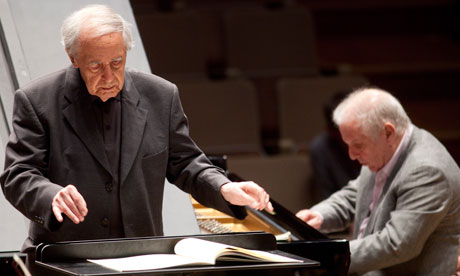I enjoyed this article about pianist and conductor Daniel Barenboim's "lack of perfection." In "Is pianistic perfection all that it's cracked up to be?" The Guardian's classical music writer Tom Service discusses the perils of expecting perfection from musicians. Because of the living in the age of electronica, "we actually have an incredibly narrow calculus of perfection when it comes to judging musical performances."
And of course, performers are aware of this, often--quite often--putting down their instruments permanently because audiences (& conductors, friends, teachers) expect superhuman, robot-like execution.
There is a lot in our zeitgeist about the perils of perfection. As musicians and music lovers, we are obsessed with groping towards an idealized conception of intonation, rhythm, ensemble. We resist giving up the notion that perfection can be achieved, for example in matching pitch with others in our immediate vicinity. And attempting to deliver a perfect rendition of a piece of music, much less an entire concert program, can lead to emotionally devastating self-doubt and anxiety. I have known of musicians who could not play in an orchestra because it is virtually impossible to attain perfection in that setting. For them it's back to the incubator of the practice room, where at least, in solitude, one can relentlessly re-do, re-play, pummelling the fingers and instrument into submission. For full-time professionals, wrong notes can potentially lead to real-world consequences--loss of income, health insurance--a financial death sentence.
All sorts of philosophical questions can be raised--what defines perfection? That alone can be debated for hours. Once every note and every rhythm is in their proper place, is the music now "perfect?" Of course not--dynamics, phrasing, shaping of notes (a world of meaning can be communicated within one whole note) need to be agreed upon.
But a much gnarlier thicket awaits--is perfection even desirable? Service writes eloquently, heart-wrenchingly, that we do not really want our performers to achieve perfection--by any definition. The universe might implode. What more there be to live for?
While I do expect to be able to discern a level of preparedeness, and some indication that the artist has spent time thoughtfully exploring the works being performed, I enjoy instrument noise, and grit, notes that bend, vibrato that goes too far, shifts that miss their mark, attacks that violate good taste. I enjoy all of that. We are humans, after all. I don't want every rendition of Chopin's 4th Ballade to sound the same. Truly I do not.
As Service reminds us, "Earlier generations of musicians maintained a different kind of fidelity to the musical work. The ideal was to communicate the expressive, emotional, and structural content of a piece of music, not just to get the notes right." Great Polish pianist Arthur Rubinstein comes to mind--his "mistakes" were a glory. Speaking of Chopin, he never played his own compositions the same way twice. Speaking of Bach.....Speaking of jazz...
There are many more issues to be explored in this topic--feel free to leave comments.
In my own life, I have found a lot of relief by pondering this statement: "Perfect is the enemy of the good."
Oft attributed to Patton, that nugget was probably first uttered by Voltaire: "...le mieux est l'ennemi du bien"
Actually, what Patton probably said was, "A good plan violently executed today is far and away better than a perfect plan next week."
Practice today, even if conditions--temperature, rosin, strings, reed, the instrument itself--aren't perfect.
Play your music, even if it's not perfect.
Plant that seed, even if it is not in the perfect place in the garden.
Yes is somehow always the right answer....
(photo credit: David Levene for the Guardian)

No comments:
Post a Comment